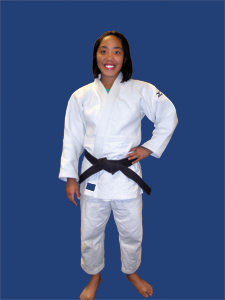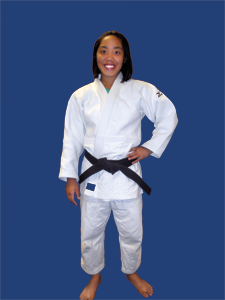Judo champ adheres to “the gentle way” both on and off the mat
A Bonner Scholar who actively volunteers in the Trenton community, Alaine Abuan also happens to be one of the best judo competitors in the country.


Alaine Abuan ’12 is not, in her own words, a very good loser. She’s much better at winning: a junior psychology major and Bonner Scholar who actively volunteers in the Trenton community, Abuan also happens to be one of the best judo competitors in the country.
As of April, the judo student of seven years was ranked 6th in America. This past summer, she competed in the martial-arts sport in the World University Games in Shenzen, China. She was one of only two women representing the U.S.
“Right now I’d like to go to the Olympics,” Abuan said. “That’s the dream, I guess. I don’t think I’m going to make 2012, obviously, but hopefully the next one.”
Her weekly regimen is intensive enough, including three lifting days, two cardio days and four practice days. But for Abuan, the sport is just the most high-profile outlet for her energies.
“For me, it’s always been just being able to be passionate about something,” she said.
Another of her passions—getting involved in the community—ultimately led her to volunteer with the Bonner Center for Civic and Community Engagement. She had been working with the Trenton Area Soup Kitchen since her freshman year when someone recommended she become a Bonner Scholar. She now manages the Bonner Center’s foodstamps initiative at the soup kitchen and serves as a tutor as well, helping patrons work toward their GEDs; she tutors math, writing and critical reading in morning and afternoon sessions.
Abuan has become well-acquainted with the Soup Kitchen regulars: “They get to know me, and it’s just nice talking to them and seeing what’s going on in their lives,” she said.
She also helped spearhead one of the Bonner Center’s newest endeavors—The Wall, a biannual newspaper on issues related to homelessness. Abuan is currently editor-in-chief of the publication, which aims to increase awareness about homelessness, break stereotypes, and provide homeless people with information on shelters, food and health centers and voting.
Abuan keeps herself busy, but it seems her experience with judo has armed her with the discipline it takes to get things done.
“It’s taught me a lot about myself, I think,” she said. “I know that I can push myself hard, and if I want to achieve something, hard work really does go a long way.”
If her rise to global competition in less than a decade seems like an extraordinary accomplishment for a young judo player, Abuan admits she’s gotten rock-solid guidance. Her coach is a pan-American judo champion and a nationals winner. “I guess knowing people who are that close to you achieve so much, it kind of puts in your head, maybe I can do it too,” she said.
Abuan says her major post-college interests lie in industrial organizational psychology, human resources and consulting—judo isn’t as popular in the U.S. as in other countries, she says, and “school is always a main priority.” But that’s not going to stop her from taking her pursuit to the next level.
Abuan doesn’t dispute that judo is a tough sport, but points out that, whereas in karate and tae kwan do the focus is more on striking an opponent, judo involves a lot of throwing, barring, and submission techniques. The word judo literally means “the gentle way.” So perhaps it’s only fitting that Abuan—someone so dedicated to lending a helping hand—excels at it.
Posted on August 30, 2011

